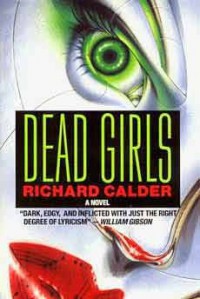Grimlock ♥ Ultra Magnus
I'm a well read grad student who's bluntly honest about all things, although I try to be most honest about myself.
Currently reading










Review - Dead Girls - Favorite Book/Favorite Author

Oh, Dead Girls! How I love you! This is Richard Calder's debut, and it goes over a lot of tropes that he explores in later novels - gender wars, men's fear of women, the hero as brute, the undersexed vixen-heroine, and the fearsomeness of science and technology. Still, I would argue that each novel has it's own charm, it's own world (with the exception of sequels, like Dead Boys and Dead Things that complete this very trilogy), and Calder's prose is so lush and lyrical that his novels are well worth reading at least once.
This is a re-read for me, although I read this about a decade ago for the first time. It's beautiful, it's complex, and it's an unflinchingly honest look at the fears of women and womanhood, and the human obsession with sex and sexuality. It takes place in a world where automatons have combined with bio-weapons, and this mix leaves girls incubators as dolls: roboto who have short lived lives, who are superficial beings who start their metamorphosis from human girls into dolls when adolescence kicks in. They infect men, who then find them another womb to impregnate with more proto-dolls. In the war of the sexes, women are both winning - and bringing the world to it's knees as they gleefully destroy it. Is this misogyny? I'm not sure. It certainly explores gynophobia, as well as admitting that men have created the dolls from their subconscious desires. In the end, the fault is laid from whence the doll originated: men. Men created dolls, and not only that, created both the supply and demand. Iggy, the narrator, loves a doll - Primavera Bobinski. She loves him as much as she can, although she's vain, haughty, and teasingly calls him 'boy-slime' every chance she gets. Still, she keeps him close, mostly physically and doesn't get involved with other boys. Which means she doesn't infect them, and a dolls main job is to make more dolls. (Which is an interesting take on the woman-as-incubator trope, since so many times it's 'must get a man and make babehs! In this case, that urge is all to deadly, turned on it's head, in fact.)
Primavera isn't evil so much as what her matrix made her. And man created the matrix to mimic his desires. This is why I find this novel squicky, but not hateful. If anything, I find it brave that Calder can explore such themes - such as fear of sex, of women/girls - without slut shaming women or laying blame at their feet. In fact, one of the only times that the word 'slut' is used, it's used to admonish a man, and not for sexual 'crimes'. No, for selling his soul. Then again, Calder has proven himself to be a writer who is true to himself, who is not afraid to explore himself - both the good and the bad - and reflect that in his writing without being hateful towards women. It's incredibly amazing to me that a man could be so introspective without taking it out on women. (And don't get me wrong, dolls are killed for the good of mankind, and there is violence against women - but it's scorned. It's looked down upon, it's exposed for it's own hypocrisy. It's glamorized in the world in which Iggy and Primavera lived, but not glamorized for the reading audience, which is yet another level of brilliance to this novel.) If you're looking for something lighthearted, for something that doesn't explore violence and expose it, then this is not the read for you.
I had a harder time finishing this than the last time. I'm older, I'm wiser, I'm more reflective. And this was a much more difficult read for that; I couldn't blow through it, and not notice these dichotomies, and how disturbing some of Calder's self-awareness was. He shines light on places not many writers tread. It was also a much more rewarding experience due to this. It takes a brave reader, and one who is willing to accept and explore the darkness of human desires, to read this book. If you are, I urge you to pick it up.
Five stars. Highly recommended. I'm actually quite disappointed that my library system doesn't have the sequels. I'd be fascinated to see how my perception of them has changed. I didn't think I could love this book more than I did, and I do. I really, really do.



 3
3